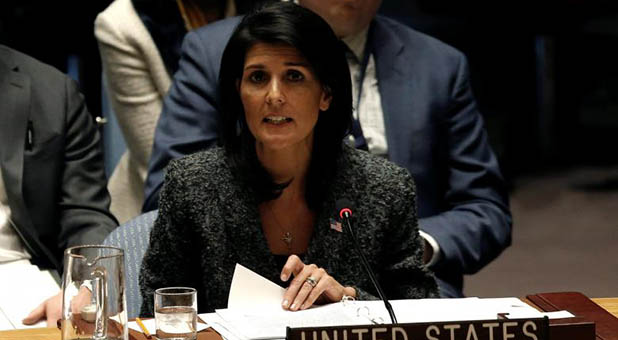Nikki Haley Says African Nations Must Do More to Help Themselves
For decades, the level of U.S. compassion for Africa was measured only in how much taxpayer money it poured into the continent, regardless of the outcome.
Not anymore.
Wednesday, during an open debate in the United Nations Security Council regarding the peace and security of Africa, U.S. Permanent Representative to the U.N. Ambassador Nikki Haley shared some compassion for the nations of the continent in the form of truth. In a nutshell, she told them they need to be doing more on their own, and in cooperation with their neighbors, to promote peace and better security.
“The United States regards itself as a partner to Africa and looks to build on that relationship and strengthen it,” she said. “And in a relationship of equals, responsibility falls on both parties to contribute to solutions. We applaud and encourage the increasing leadership the African Union and African Members States have exercised in contributing to peace operations and battling terrorist and insurgent groups. And today, we reaffirm the African Union’s role as an indispensable partner to both the United States and the United Nations in promoting peace and security in Africa.
But true progress cannot be achieved, she added, unless international efforts are “accompanied by accountability” on the part of African governments, particularly those involved in conflict, such as Nigeria, Somalia and South Sudan, where 14 million people are at risk of famine. The U.S. is leading the international effort, which Haley said is under-reported in the media, and has announced $446 million in new humanitarian aid for the region—bringing the total to $1.4 billion for the current fiscal year alone.
“But our ability to provide real relief is hampered by one inescapable fact: armed conflict is the primary cause of food insecurity in South Sudan, Nigeria and Somalia,” she said. “Famine in Africa is an issue of peace and security. People are dying of hunger not due to acts of God, but acts of man. It is the parties to these conflicts that bear direct responsibility. They are responsible for the lack of access to people in need of food, water and health services. They are responsible, as well, for the millions of refugees and internally displaced persons suffering in Africa today.”
In Somalia, more than half the population is in need of humanitarian assistance, but al-Shabaab terrorist attacks on aid workers is preventing them from getting the help they need. In South Sudan, a refugee crisis could soon eclipse the tragedy of the Rwandan genocide because of government corruption that is obstructing aid efforts.
“These famines are a sign of a collective failure,” Haley said. “And any effective response must begin with the nations of Africa themselves. AU Member States must ramp up their response to this crisis. AU Commission Chair Faki spoke for many of us when he said, ‘I cannot hide my deep frustration at the silence and inaction of Africans in the face of the terrible tragedy of famine in these regions.’
“We must continue to look for ways to bolster the capabilities of member states to promote peace and security. The African Union must work with sub-regional organizations and individual states to confront peace and security challenges with one voice.
“African nations must also work constructively with the United Nations to address an underlying cause of the conflict that is driving the risk of famine in Africa. I have spoken many times about the relationship of human rights violations to conflict.”
The ambassador said a commitment to promoting human rights must take precedence over politics in order for Africa to secure peace and security. But, the U.N. member nations from the African Group have damaged their own cause, she added.
“When the nations of the African Group put forward a country like the Democratic Republic of Congo to be a member of the Human Rights Council, it does more than just weaken that body—it adds to the conflict that is causing so much suffering on that continent,” she said. “This is a pivotal time for the Human Rights Council. It has the potential to be an asset to the men, women and children suffering in Africa today.
“But it can only play that role if its membership consists of nations committed to promoting and upholding universal human rights. And that, in turn, depends on the African states putting forward credible candidates with strong human rights records. The nomination of the DRC is an inexcusable failure of this process.
“My hope is that we can all summon the political will and courage to change the trajectory of the ongoing political and humanitarian crises in Africa. Famine should not exist in 2017. Our duty is to hold those responsible to account. The United States will continue to do its part.” {eoa}















































